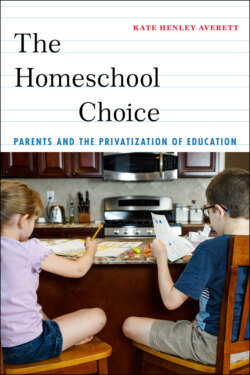Читать книгу The Homeschool Choice - Kate Henley Averett - Страница 9
На сайте Литреса книга снята с продажи.
School Choice and the Privatization of Education
ОглавлениеEducation in the United States is moving away from the common-school model of education and toward a marketplace or “school-choice” model.4 In the common-school model, the ideal is that all children be provided with a similar educational experience, grounded in preparing them to engage in a democratic society. Under the school-choice model, however, it is theorized that the quality of education for all students will increase if schools are forced to compete with each other in order to continually offer a better “product” to children and parents, who are understood as the consumers of educational services.5
The rise in both the popularity and the acceptability of homeschooling has occurred in tandem with the rise of the rhetoric of school choice, where homeschooling is one of the many educational choices that should be available to parents and children. The school-choice model is itself part of a larger trend toward the privatization of public education and other public services—what scholars have come to call the “neoliberalization” of public education.6 Neoliberalism refers to a broad set of global economic policies focused on competition, market discipline, and fiscal austerity.7 Privatization of what were previously public services—including education—is one of the hallmark practices of neoliberalism. While the privatization of public education is most often associated with the emergence of privately run (and for-profit) public charter schools or voucher programs that allow children to attend private schools using public funding, homeschooling is arguably the most radical manifestation of this trend, in which education moves into the private realm of the family home. Just a few decades ago, homeschooling was considered a deviant practice, but the privatization of education has helped to legitimize it.8
How are neoliberal education reforms affecting families? The narratives I present in this book give us a rich understanding of how parents make decisions about their children’s education under the school-choice model, revealing the ways in which parents navigate the rhetoric of school choice and the corresponding changes in education. The decisions that parents make around homeschooling help illuminate the changing relationships among the family, the state, and public schools, and the stories I present in this book highlight how trust in, and reliance upon, public services are changing, and what this means for families.
